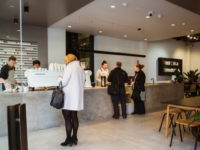
As zero-waste shopping starts to capture the attention of consumers, a new association of independent zero waste grocers has been established in New Zealand to promote this way of shopping.
Bron Green, Sustain Aotearoa president and Be Free Grocer owner, spoke to Inside FMCG about how the grocers are managing the “new normal”.
“Since late 2018 the number of independently owned zero-waste grocers in Aotearoa, New Zealand has grown exponentially from one in November 2018 to 14 now and growing! We quickly realised that if we collaborated we could share knowledge, contacts and suppliers as well as tackle systems issues further up the supply chain as a collective voice,” Green said of the origins of the group.
Inside FMCG: How did the Covid-19 outbreak affect zero-waste grocers?
Bron Green: For sure it impacted us. I think most of us saw a surge in sales before lockdown followed by an abrupt period where the tap was turned off. Every global citizen can relate to this but things moved extremely quickly so after lockdown commenced in New Zealand there was about a week and a half of uncertainty, we weren’t sure whether we could operate at all and if so in what capacity.
Policy and guidelines were changing by the day and we stayed in close zoom contact with each other during this time to disseminate info and offer support to each other. When it became clear that we were considered an “essential service” many of us chose to offer a contactless delivery service during lockdown.
At the start of lockdown, most of us didn’t have websites so many of us used the opportunity to pull many sleepless nights and get websites up and running so that customers could order food online. However, we also took email and phone orders during this time. Logistically this was a huge undertaking for any small business and I think the support we were able to offer each other during this time was invaluable. Covid-19 required us all to pivot hugely and adjust our business models in a very short space of time and on modest budgets in order to respond to an unprecedented situation.
Inside FMCG: Do you expect more zero waste and refill store models to open now, especially now that people are spending more time at home?
BG: Yes we do, the numbers are growing all the time in New Zealand, what is really exciting is that these types of stores are not just confined to our main centres such as Auckland, Wellington and Christchurch. There are also an increasing number of stores opening in New Zealand’s provincial regions and thus the concept of zero-waste shopping is becoming more and more mainstream and accessible.
Inside FMCG: Tell us about working with the local zero waste grocers in NZ.
BG: Working with the other members of Sustain Aotearoa has already been a hugely positive experience and we’ve only been an officially incorporated society for a couple of months. We wanted to create a network that will provide individual members with similar benefits to being part of a franchise whilst also allowing each store to maintain their individuality and autonomy. We all have a shared goal to reduce waste but are able to stay true to our own specific ethos, business models, product range and customers. One of the great things about this is that we can share knowledge about various suppliers but we can also choose suppliers that are local to our individual regions thus supporting our regional and national economies.
Inside FMCG: How does Sustain Aotearoa convince people to start a zero-waste business, when the pandemic has led to so much cost-cutting?
BG: We [don’t need] to recruit or convince other members to join us. Several zero waste grocers had just opened or were about to open when Covid-19 hit New Zealand so having a network already established has been a great way to encourage and share info in order to keep the momentum going.
Inside FMCG: Do you expect an increase in these stores or associations in Australia?
BG: I think there is rapid growth in the prevalence of zero-waste stores across the globe. We have reached this tipping point where informed and concerned global citizens are taking matters into their own hands and responding to a need and a demand for zero-waste foodstuffs. Therefore, not only are we seeing an increasing number of zero waste franchises such as The Source (an Australian start-up that is now in several countries across the world). We are also seeing an exponential proliferation of independently owned zero waste stores across the globe and Australia is quite a bit busier [than] it was when I lived in Melbourne 10 years ago.
Inside FMCG: What are your tips for shoppers to maintain and continue practicing sustainability in the “new normal”?
BG: I guess I can only really speak to the New Zealand context and I understand we are in the very fortunate position that our domestic movements and behaviour are pretty much back to pre-Covid life. My number one tip going forward would be to shop local and shop New Zealand grown and made. Now more than ever is a time to support our local food growers. When it comes to supply of imported foods products I think we are still a long way off seeing the full effect of Covid.
We may find that for a while we aren’t able to import the variety of exotic foodstuffs that we have been used to having at our fingertips. I think the world-over, we will realise that we need to make use of what is grown locally, this necessary shift will help our respective local economies rebuild.
From a zero-waste point of view buying local/ locally grown is one of the most efficient ways to reduce supply chain waste, lower the carbon footprint of food and work towards a circular economy. The Covid outbreak has led to many brands to use disposable plastics again, especially in home deliveries. That’s devastating because that shift is an easy default caused by fear-mongering marketing rather than a basis of scientific fact. Firstly, non-porous surfaces can be disinfected to kill the virus and secondly, of the common food-packaging substrates, plastic is one that the virus can survive on for the longest.
Luckily, in New Zealand the packaging substrate was not determined for us, rather the business’s food handling and packaging protocols and the contactless delivery protocols were the main focus. We were all able to package and deliver food in paper bags or glass jars. We all worked with extremely strict hygiene procedures in place and were transparent with our customers about the procedures that we had implemented to keep them and ourselves safe.












